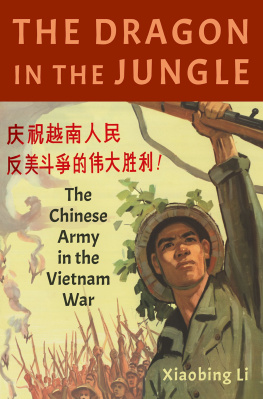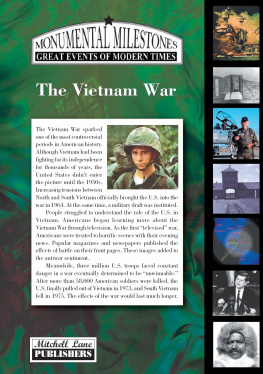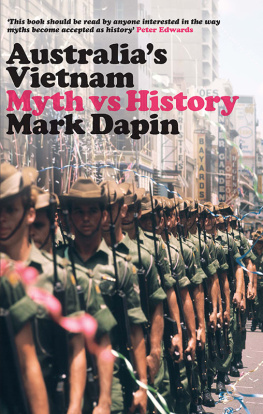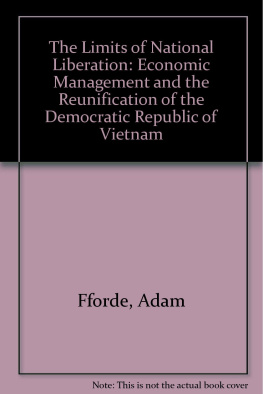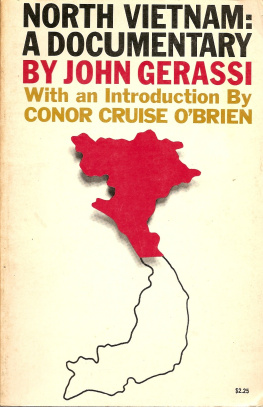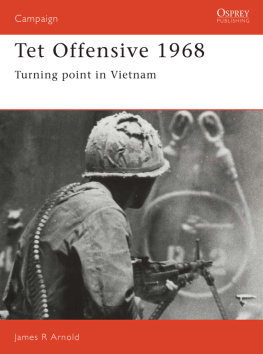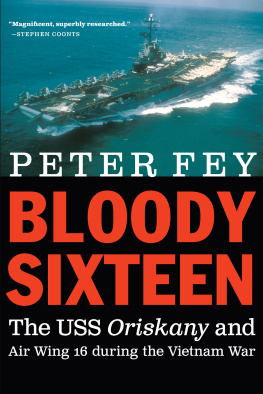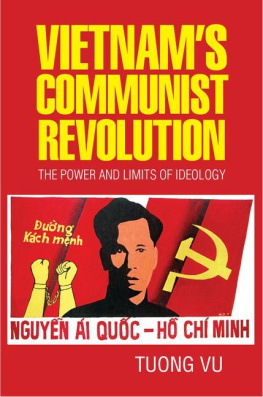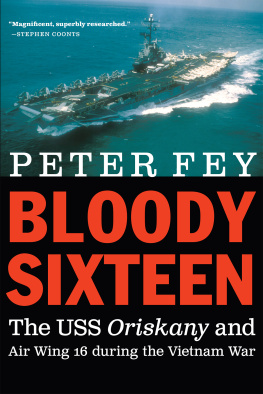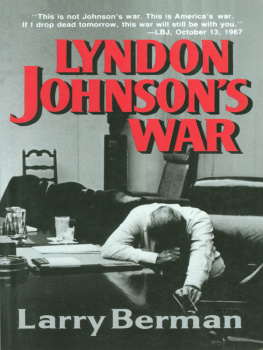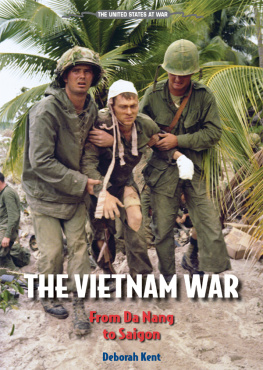Mark Clodfelter - The Limits of Air Power: The American Bombing of North Vietnam
Here you can read online Mark Clodfelter - The Limits of Air Power: The American Bombing of North Vietnam full text of the book (entire story) in english for free. Download pdf and epub, get meaning, cover and reviews about this ebook. year: 1989, publisher: Macmillan USA, genre: Politics. Description of the work, (preface) as well as reviews are available. Best literature library LitArk.com created for fans of good reading and offers a wide selection of genres:
Romance novel
Science fiction
Adventure
Detective
Science
History
Home and family
Prose
Art
Politics
Computer
Non-fiction
Religion
Business
Children
Humor
Choose a favorite category and find really read worthwhile books. Enjoy immersion in the world of imagination, feel the emotions of the characters or learn something new for yourself, make an fascinating discovery.

- Book:The Limits of Air Power: The American Bombing of North Vietnam
- Author:
- Publisher:Macmillan USA
- Genre:
- Year:1989
- Rating:4 / 5
- Favourites:Add to favourites
- Your mark:
- 80
- 1
- 2
- 3
- 4
- 5
The Limits of Air Power: The American Bombing of North Vietnam: summary, description and annotation
We offer to read an annotation, description, summary or preface (depends on what the author of the book "The Limits of Air Power: The American Bombing of North Vietnam" wrote himself). If you haven't found the necessary information about the book — write in the comments, we will try to find it.
The Limits of Air Power: The American Bombing of North Vietnam — read online for free the complete book (whole text) full work
Below is the text of the book, divided by pages. System saving the place of the last page read, allows you to conveniently read the book "The Limits of Air Power: The American Bombing of North Vietnam" online for free, without having to search again every time where you left off. Put a bookmark, and you can go to the page where you finished reading at any time.
Font size:
Interval:
Bookmark:
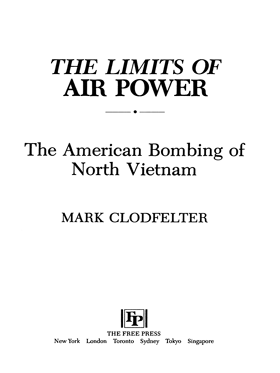
Copyright 1989 by Mark Clodfelter
All rights reserved. No part of this book may be reproduced or transmitted in any form or by any means, electronic or mechanical, including photocopying, recording, or by any information storage and retrieval system, without permission in writing from the Publisher.
The Free Press
A Division of Simon & Schuster Inc.
1230 Avenue of the Americas
New York, N.Y. 10020
www.SimonandSchuster.com
Printed in the United States of America
printing number
6 7 8 9 10
Library of Congress Cataloging-in-Publication Data
Clodfelter, Mark.
The limits of air power: the American bombing of North Vietnam / Mark Clodfelter
p. cm.
Bibliography: p.
Includes index.
ISBN 13: 978-0-0290-5990-6
ISBN 0-02-905990-9
eISBN 13: 978-1-4391-0542-9
Vietnamese Conflict, 1961-1975Aerial operations, American. United States. Air ForceHistoryVietnamese Conflict, 1961-1975. 3. Air power. I. Title.
DS558.8.C56 1989 88-36710
959.704348-dc19 CIP
TO WALTER A. CLODFELTER, JR. Corporal, 20th Air Force, USAAF, 1945-1946 AND JOHN R. ALLEN Captain, 8th Air Force, USAF, 1972-1973


O n April 10, 1988, Richard M. Nixon told NBCs Meet the Press that his greatest mistake as President was not Watergate but his failure to bomb and mine North Vietnam early in 1969 as he later did in 1972. If we had done that then, he said, I think we wouldve ended the war in 1969 rather than in 1973.
The former Presidents sentiments are not unique. Indeed, most of the wars high-ranking air commanders share them. The conviction that massive bombing of the North could have won the war in 1969or 1965has permeated todays Air Force and reinforces a doctrine that emphasizes victory through strategic bombing. The signing of the peace treaty less than a month after Nixons Linebacker II bombing offensive, in which B-52s and fighter aircraft dropped 20,000 tons of bombs on North Vietnams heartland in eleven days, indicates to many that air power alone ended the conflict. An excerpt from a staff sergeants 17 March 1988 letter in Stars and Stripes typifies the current Air Force perception of the December 1972 air campaign: In retrospect, Linebacker II erased all doubts that the Vietnam War could have been won. Unfortunately, there was nothing done in 1972 that could not have been done in 1965.
The President and the staff sergeant both ignore the essence of why bombing worked in 1972because it was the proper instrument to apply, given Nixons specific goals and the political and military situation that then existed. The President had two aims in 1972, and both were limited: an American withdrawal that did not abandon South Vietnam to an imminent Communist takeover and, after October, convincing South Vietnamese President Nguyen Van Thieu that the United States would back the South if the North resumed hostilities. Having received a free hand in Vietnam from the Chinese and Soviets, Nixon could apply air power without many of the restraints plaguing his predecessor. Moreover, for the first time since Americas full-fledged involvement in 1965, Hanois leaders decided to wage a sustained conventional war, an effort requiring vast logistical support that was vulnerable to air attack. This specific combination of goals and conditions was not present until 1972.
Air commanders, however, remained convinced throughout the war that bombing would ultimately compel the North Vietnamese to stop fighting. The air chiefs conviction stemmed from World War II strategic air campaigns, which they believed demonstrated that air power could wreck an enemys capability to resist, and from the air doctrine emerging after the perceived aberration of Korea, which contended that the strategic principles suitable for a war against the Soviet military machine could be adapted to any level of conflict. From mid-1964 on, air commanders advised political leaders to launch a Linebacker II-type assault on North Vietnam. They failed to consider whether massive bombing suited the nature of the war, which was primarily a guerrilla struggle before March 1972 (with the notable exception of the 1968 Tet Offensive), or whether it suited American war aims. Nurtured by a deep-rooted tradition stressing battlefield annihilation, most commanders never fully comprehended the civilian leaderships desire to keep the war limited. Many air chiefs also failed to realize that American objectives in Vietnam changed after Tet.
American political leaders likewise did not thoroughly consider whether bombing was an appropriate instrument in Vietnam. Concerned about Soviet or Chinese intervention and unwilling to focus attention away from his Great Society programs, President Lyndon Johnson believed in February 1965 that the threat of destruction presented by limited bombing would deter North Vietnam from supporting the Viet Cong. The President and his advisers had seen the Soviet Union retreat in Cuba from the threat of American air power, and they could not imagine the North Vietnamese withstanding a similar display of resolve. After almost five months of air strikes, however, Johnson had a change of heart. In July 1965, he concluded that the bombing could not stop Northern participation in the war and that strengthening South Vietnam had higher priority. Still, his decision was not final, and for the remainder of his presidency his view of bombings utility vacillated between a means to restrict Northern backing of the Viet Cong and a means to win the war. Four years later, Nixon used air power to guarantee an American withdrawal by thwarting the 1972 Easter Offensive and to persuade both North and South Vietnam to sign a cease-fire agreement. Although his bombing was more fruitful than Johnsons, Nixons recent comments imply that his successful application of air power owed more to happenstance than to sound reasoning.
In the final analysis, the supreme test of bombings efficacy is its contribution to a nations war aims. Clausewitzs definition of war as a continuation of political activity by other means provides the only true measure for evaluating air powers effectiveness. My goal is to provide such a Clausewitzian appraisal of the air war against North Vietnam. I have attempted to do so by evaluating the three air campaigns against the NorthRolling Thunder (2 March 1965-31 October 1968), Linebacker I (10 May 1972-23 October 1972), and Linebacker II (18-29 December 1972)in terms of how effectively they supported American war aims. I have also tried to place the air war in its broadest possible historical setting by briefly analyzing the U.S. air campaigns in World War II and Korea, as well as the doctrine emerging from them. Those earlier efforts helped mold the air power convictions of American civilian and military leaders during Vietnam.
Evaluating the political efficacy of the three air offensives required first identifying the specific war aims guiding each. The goals were disparate; not only did they vary from campaign to campaign, but many of them restricted the application of air power. These latter goals, achievable only by
Font size:
Interval:
Bookmark:
Similar books «The Limits of Air Power: The American Bombing of North Vietnam»
Look at similar books to The Limits of Air Power: The American Bombing of North Vietnam. We have selected literature similar in name and meaning in the hope of providing readers with more options to find new, interesting, not yet read works.
Discussion, reviews of the book The Limits of Air Power: The American Bombing of North Vietnam and just readers' own opinions. Leave your comments, write what you think about the work, its meaning or the main characters. Specify what exactly you liked and what you didn't like, and why you think so.

